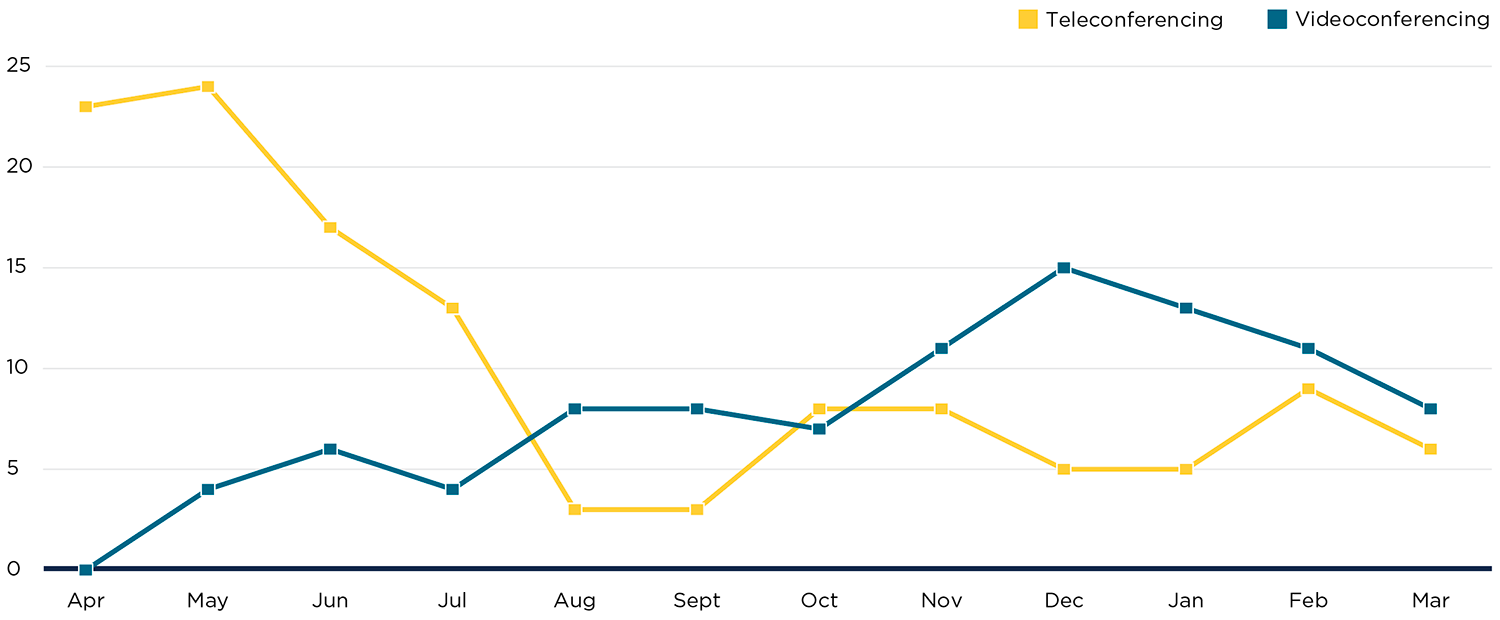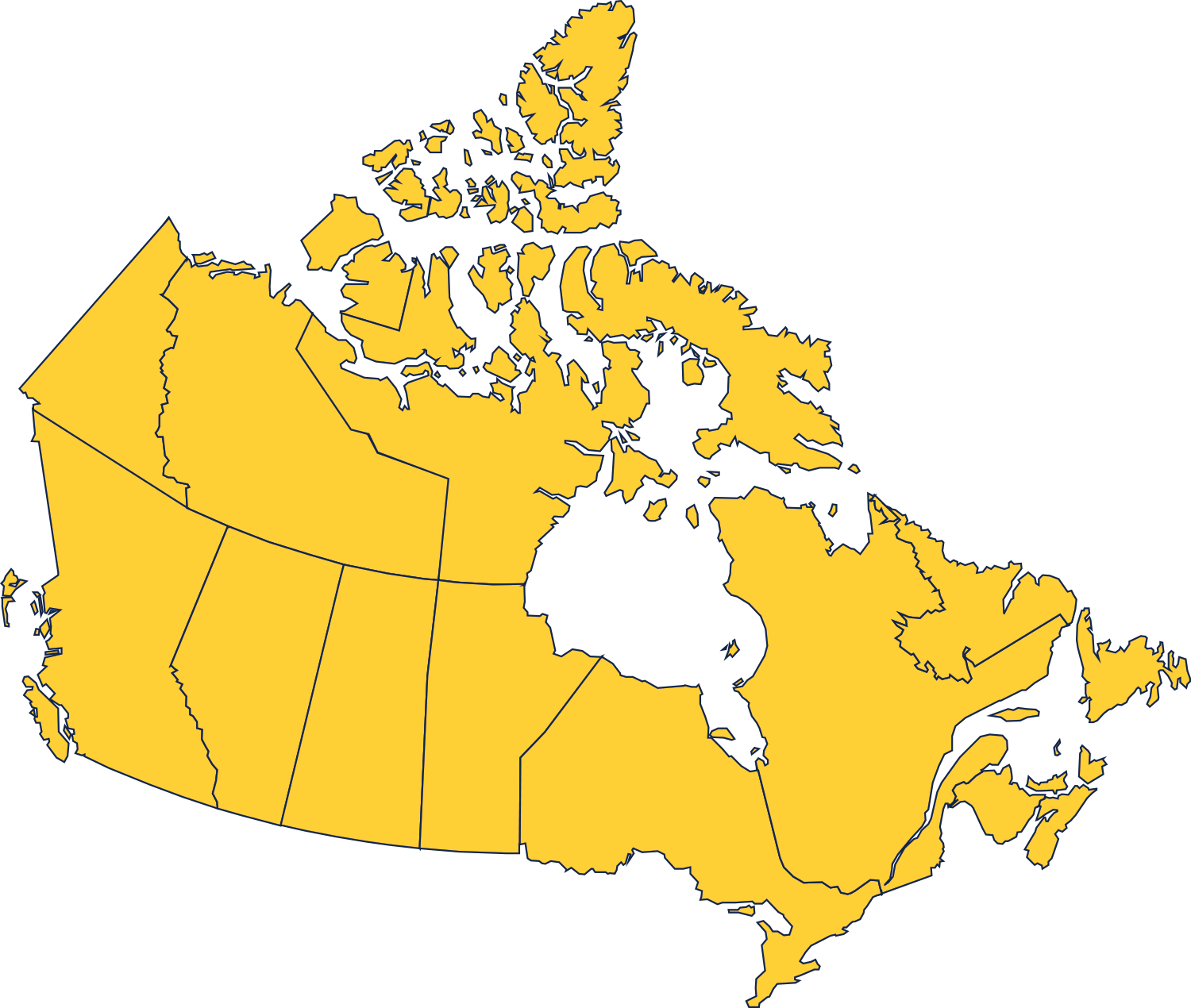Ministers
In our efforts to provide the best service possible and the most up to date information to you, our clients, CICS welcomes your comments and suggestions.
Here are our coordinates:
General Inquiries
Telephone: 613-995-2341
Fax: 613-996-6091
E-mail: info@scics.ca
Website: www.scics.ca
Mailing Address
P.O. Box 488, Station ŌĆśAŌĆÖ
Ottawa, Ontario
K1N 8V5
Location / Deliveries
222 Queen St., 12th Floor
Ottawa, Ontario
K1P 5V9
Highlights
Overview of intergovernmental conference activity in 2020-21.
Deputy Ministers
Senior Officials
Others
Federal-Provincial-Territorial
Provincial-Territorial
In-person
Teleconference
Videoconference
219 Conferences
By Month
Figure 1: The evolution over the months of teleconferences vs videoconferences in 2020ŌĆō21. (No in-person conferences were served.)

Totals:
- Apr 2020: 23
- May 2020: 28
- Jun 2020: 23
- Jul 2020: 17
- Aug 2020: 11
- Sept 2020: 11
- Oct 2020: 15
- Nov 2020: 19
- Dec 2020: 20
- Jan 2021: 18
- Feb 2021: 20
- Mar 2021: 14
| Monthly | Total | In-person | VC | TC |
|---|---|---|---|---|
| April | 23 | 0 | 0 | 23 |
| May | 28 | 0 | 4 | 24 |
| June | 23 | 0 | 6 | 17 |
| July | 17 | 0 | 4 | 13 |
| August | 11 | 0 | 8 | 3 |
| September | 11 | 0 | 8 | 3 |
| October | 15 | 0 | 7 | 8 |
| November | 19 | 0 | 11 | 8 |
| December | 20 | 0 | 15 | 5 |
| January | 18 | 0 | 13 | 5 |
| February | 20 | 0 | 11 | 9 |
| March | 14 | 0 | 8 | 6 |
| Total | 219 | 0 | 95 | 124 |

219 Conferences
About
Mandate
The Canadian Intergovernmental Conference Secretariat (CICS) is an impartial agency whose mandate is to provide administrative support and planning services for federal-provincial-territorial and provincial-territorial conferences of First Ministers, Ministers and Deputy Ministers, throughout Canada.
Our primary objective is to relieve client governments and departments of the numerous technical and administrative tasks associated with planning and conducting multilateral conferences, thereby enabling participants to concentrate on substantive intergovernmental policy issues.
The SecretariatŌĆÖs services are available to federal, provincial and territorial government departments that are called upon to organize and chair such meetings.
Being truly intergovernmental in nature, the agency is funded by the federal and provincial governments, and its staff is comprised of federal, provincial and territorial public servants.
Mission
We thrive on helping governments by delivering impartial and professional conference services, with innovative solutions.
Vision
Working together to make it happen.
Values
Excellence
We strive to fulfill the requirements of our mandate through teamwork.
Respect
We offer a collegial and rewarding work environment that fosters trust, civility, dignity and fairness.
Integrity
We conduct ourselves in an ethical, honest and transparent manner and with financial probity.
Organizational Structure
SecretaryŌĆÖs Office
Serves as the executive office of CICS.
Its function is to provide support to the Secretary in his day-to-day activities as the deputy head of the agency.
Information Management and Technology Services
Responsible for information management, information technology and library services to the organization. It also maintains a permanent archive of audio-visual records, documents and a selection of photographs from various conferences served by CICS.
Conference
Services
Delivers the agencyŌĆÖs core mandate by providing support and advice to the Chair and Co-Chairs with respect to the planning, organizing and the logistics management of senior-level intergovernmental conferences.
Conference Services personnel are a mix of federal, provincial and/or territorial government employees. Additional personnel such as interpreters, translators, technicians and security guards are contracted to join the teams, as required.
Corporate
Services
Responsible for the agencyŌĆÖs financial, human resources, procurement and security services. This includes providing functional direction and guidance to managers and staff in the delivery of conference services.
Our executive team is experienced and committed to delivering innovative conference solutions. Working together, they are focused on excellence in client service and achieving value-for-money for all stakeholders.





Andr├® M. McArdle, Secretary; V├®ronique Beaumier-Robert, Assistant Secretary; Rodrigue Hurtubise, Director, Conference Services; Mario Giasson, Director, Information Services; Charles Young, Director, Corporate Services.
SPOTLIGHT: CICS welcomed a new Assistant Secretary
In March 2021, V├®ronique Beaumier-Robert became CICSŌĆÖs new Assistant Secretary and Chief Financial Officer. With over fifteen years of middle and senior level management experience in the public sector, including three years in the position of Director of Corporate Services at the Secretariat, she is very knowledgeable of current issues and challenges, and she is a key player and a great asset to our organization.
She holds a Bachelor of Business Administration (Accounting) from the University du Quebec en Outaouais, as well as a CPA, CMA designation.
If youŌĆÖve attended an intergovernmental meeting, you may have had the pleasure to meet our employees. On conference sites, they are greeting you at the registration desk, providing technical support in the meeting room, or offering a wide variety of other administrative support services from our satellite office. However, for the past year, they have been providing our services from home, continuing to relieve clients of the various technical and administrative tasks associated with planning and conducting multilateral conferences in an entirely virtual format, and supporting effective meetings in the new COVID-19 reality. Virtual conferencing has required a complete shift in our operations, approach, and many of our services.

CICS Staff Photo
As a client-focused organization with only 32 FTEs, almost all of CICSŌĆÖs employees are trained to serve conferences, including during peak periods. Our vision ŌĆ£Working together to make it happenŌĆØ describes our work ethic perfectly: our dedicated teamwork helps you achieve the success of your event. Our employees are motivated, dedicated, and proud of the work they do. They are vibrant and creative, and are always searching for the best and latest technologies to improve services provided both internally and to our clients.
We are extremely proud of our employees, and we believe it is essential to invest in their well-being, as well as in their training at both an individual and a corporate level. Continuous learning opportunities are offered to ensure we stay on top of current trends, and to provide advancement opportunities within our agency.
Much work is completed behind the scenes to ensure well-organized and efficient senior-level intergovernmental meetings. We wouldnŌĆÖt have been able to achieve all that we have this year without our caring and competent employees.
Representation from the Provinces and Territories
A number of positions in the Conference Services division are reserved for provincial and territorial (PT) public servants who are seconded to the agency from their respective governments. CICS offers these employees a unique developmental opportunity in the field of intergovernmental affairs. The secondments are usually three-year terms. The presence of our provincial and territorial government colleagues helps ensure that CICS can fulfill its mandate as a neutral intergovernmental body, and also boost the organizationŌĆÖs knowledge of provincial and territorial governments. Upon completion of their secondment, the PT employees return to their respective governments enriched with the experience of working with key sectors of intergovernmental activity at the most senior levels.
2020 Award Recipients
The SecretaryŌĆÖs award of excellence is given annually for exceptional contributions made by the agencyŌĆÖs employees to the SecretariatŌĆÖs efficient operations. Among the criteria utilized to receive this award are excellence of work on special projects or major initiatives, exemplary behavior and ultimately, the positive results achieved. In 2020, the successful laureates for this award were Thomas Walsh and Andr├® Viau.

SecretaryŌĆÖs Award Winner: Andr├® Viau, Support Analyst, Infrastructure and Operations

SecretaryŌĆÖs Award Winner: Thomas Walsh, Conference Procurement and Technical Services Officer
The EmployeeŌĆÖs Choice Award is given once a year by a vote of all employees to an individual who exemplifies the criteria of the theme announced. This yearŌĆÖs theme was ŌĆ£DedicationŌĆØ. Throughout the year, Rodrigue Hurtubise demonstrated a dedication to the organization that was unparalleled. Rodrigue ensured the continuity of our business despite a global pandemic, and he went above and beyond in adapting our business model to satisfy our clients. For this reason, employees voted for him to receive the 2020 EmployeesŌĆÖ Choice Award.

EmployeeŌĆÖs Choice Award Winner: Rodrigue Hurtubise, Director, Conference Services
Services
What We Do:
The Secretariat offers logistical and administrative support services for senior-level intergovernmental conferences. We ensure continuity and neutrality in the delivery of conference services, while also offering innovative and resource-efficient solutions.
In addition to our full range of services in support of in-person intergovernmental meetings, detailed on our website, our teams have worked diligently over the past years (and even more so since the beginning of the pandemic) to become experts in virtual conferencing, in order to support our clients with this alternative format. This has enabled us to offer the following services in support of videoconferences as their popularity grew through 2020ŌĆō21:
Online registration and list of delegates
Preparation/distribution of a logistics note to participants
Technical coaching and support for organizers/delegates
Translation and distribution of documents
Online access to documents from CICSŌĆÖ secure portal
Greeting/vetting of participants and presenters
Remote simultaneous interpretation
Reservation of a studio and multimedia support
Recording of discussions
Archiving of official documents
Who We Serve:
- First Ministers/Premiers
- Ministers
- Deputy Ministers
Most senior-level intergovernmental conferences are supported by our organization. A complete list of our client sectors is available in this report, under Sectors Served.

How to Request Our Services
CICS services are available to any federal, provincial or territorial government department that organizes an intergovernmental meeting of First Ministers, Ministers or Deputy Ministers.
For in-person meetings, the host government is responsible for arrangements and the costs of conference rooms and hospitality; CICS covers the cost of most other conference services. For virtual meetings, most costs are assumed by CICS.
To make your conference as successful as possible, we encourage you to contact us as soon as you start planning it. We recommend a lead time of at least 4ŌĆō6 weeks for in-person/hybrid meetings, and 2ŌĆō3 weeks for videoconferences.
We look forward to working with you on your next event!
- Complete and submit our online request form; or
- Contact our Director of Conference Services at 613-222-6411/613-995-4328 or info@scics.ca.
For questions concerning CICS conference archives, please contact info@scics.ca. We will be pleased to help you.

The Virtual Shift

As the COVID-19 crisis evolved, collaboration between federal, provincial and territorial governments became even more critical in responding to the urgent health, economic and social impacts of the pandemic. As a result, CICS saw the number of intergovernmental meetings nearly double in comparison to the level seen in 2019ŌĆō20. This record level and pace of activity, as well as the complete shift to virtual meeting formats, resulted in an even greater reliance on the services and competencies of CICS by conference delegates and meeting organizers including permanent secretariats that supported intergovernmental relations in the 39 sectors of activity served in 2020ŌĆō21. Although the number of client sectors served was very similar to the two previous years, many needed to hold meetings on a very regular basis which was an important reason for the high number of meetings served, overall.
Throughout the year, our Agency demonstrated its capacity to respond (often on short notice) to the very high demand for its support of virtual meetings, ensuring that its services remained responsive, forward looking and of the highest quality. More than ever, CICS made good on its commitment to proactively lead the way, to advise, guide and encourage its clients to adopt new and innovative approaches to support senior-level intergovernmental meetings. CICSŌĆÖ role in this regard was even more important in a fully virtual mode, to help maintain strong, open and collaborative relationships between the federal, provincial and territorial governments at a most critical time. For example, CICS personnel spent considerable time and effort testing various videoconference (VC) technologies to find the best solutions for our clients, and later on, coaching meeting chairs, participants and presenters in the use of the platforms ahead of, and during meetings. As part of our promotional work in support of the VC format, we informed and reassured meeting organizers on aspects such as security, technical requirements, VC etiquette and other best practices. Service delivery procedures and tools were reviewed and adapted as required to fit the much more rapid pace of planning and delivering virtual meetings, including greatly reduced lead times to organize all the necessary supports such as AV, interpretation, etc.
This expanded leadership role in the midst of the COVID-19 pandemic was enabled and fulfilled in 2020ŌĆō21 through the ongoing implementation of the best practices and the ŌĆ£gold-standardŌĆØ technologies and methods identified during the modernization exercise that CICS conducted in 2018.
What we implemented
Improved experience for videoconferences delegates
New project teams were created to analyze virtual conferencing uptake, current models and technologies utilized, as well as client needs and feedback to improve upon the current model. With an eye on heightened client needs for flexibility and adaptability in conference delivery, this included the investment in new assets to maintain and increase the accessibility to conferences for attendees, while ensuring client satisfaction in light of an environment focused on virtual and (eventually) hybrid conferencing formats.
Client guidance tools
Best practices intended for organizers and the chairs and participants in intergovernmental videoconferences and teleconferences were developed and immediately implemented to coincide with the adoption of virtual meeting formats early in the fiscal year. Technical coaching and support was also offered to new users of videoconferencing formats and platforms.
Digitization of our FPT archives
Most of our historical paper records were digitized this year, with the eventual goal of making our unique collection of FPT archives more accessible, and reducing some of the costs associated with the preservation and storage of these files. The digitization of over 60,000 documents was completed in 2021ŌĆō22.
Performance
Overview
Two surveys are used to assess client satisfaction, one being an annual sampling of conference organizers and the other one focusing on delegatesŌĆÖ perspective. Both provide valuable and very timely feedback on all aspects of the administrative and technical support CICS provides. In turn, this insight informs the SecretariatŌĆÖs decisions about the alignment of its services and approaches with clientsŌĆÖ evolving needs and priorities.
Both surveys conducted in 2020ŌĆō21 showed a very high client satisfaction rate:
- For conference delegates, the satisfaction rate reached 88%, a remarkable achievement in an all-virtual mode and at a time of complete and unforeseen transformation of CICSŌĆÖ operations and services as a result of COVID-19. This satisfaction rate being slightly below the 90% target most likely reflects the challenges faced by our clients as they adapted to the new videoconferencing format and platform, in spite of the ŌĆ£Best Practices,ŌĆØ advice and coaching that CICS provided to meeting chairs, other participants and presenters through the year.
- The rating from organizers of virtual meetings served was 91.8%, the highest rating in five years for the meeting format concerned.
Meeting organizers continued to favor CICS to help them plan and deliver their future meetings. The SecretariatŌĆÖs ability to listen to and understand conference requirements, the timely and thorough information and advice provided by our teams during planning, and the monitoring and support services offered during meetings were amongst the highest ranked elements. We also saw an increase in our clientŌĆÖs satisfaction with the way CICS clearly and comprehensively identified and implemented interpretation options.
Ninety-six percent of respondents indicated that the Secretariat fully addressed all conference needs, and that services offered resulted in an efficiently run meeting that met operational expectations.
In 2020ŌĆō21, CICS provided its services to 219 senior-level intergovernmental conferences, nearly twice the number served the previous year and the highest number of conferences served in a single year in the SecretariatŌĆÖs history. The all-virtual environment included 124 teleconferences and 95 videoconferences, the latter being a completely new venture for the Secretariat which, until then, had only served the more ŌĆ£traditionalŌĆØ form of videoconferencing whereby delegates at various locations across Canada participated from boardrooms equipped with permanent VC equipment. The need for social distancing made such facilities inappropriate, and ŌĆ£at-deskŌĆØ technologies had to be adopted instead. In spite of this significant shift in approach, overall client satisfaction levels continued to be very high.
Professionally planned and supported conferences, including effectively addressing unforeseen challenges.
Performance indicatorsClient (conference organizer) satisfaction levels for the full range of CICS services provided in support of PT and FPT conferences.
Target
Results
ClientsŌĆÖ and conference participantsŌĆÖ conference needs identified and addressed accordingly.
Performance indicatorsClient (conference participant) satisfaction levels for the full range of CICS services provided in support of PT and FPT conferences.
Target
Results
1 Although this result is slightly below target, it is considered an outstanding success in this fiscal yearŌĆÖs transformational context. The slight shortcoming most likely reflects the challenges faced by our clients as they adapted to the new videoconferencing format and platform.
 In-person conferences
In-person conferences
2017ŌĆō18
2018ŌĆō19
2019ŌĆō20
2020ŌĆō21
 Teleconferences
Teleconferences
2017ŌĆō18
2018ŌĆō19
2019ŌĆō20
2020ŌĆō21
 Virtual conferences
Virtual conferences
2017ŌĆō18*
2018ŌĆō19*
2019ŌĆō20*
2020ŌĆō21**
* For 2017ŌĆō18, 2018ŌĆō19 and 2019ŌĆō20, figures included hybrid conferences, that is in-person meetings where either teleconference or videoconference equipment was used to link-in remote participants or presenters.
** In 2020ŌĆō21, the 95 conferences indicated were exclusively virtual, and were all held by videoconference.
For 2020ŌĆō21, these figures show a 39% increase in meeting activity at the Deputy MinistersŌĆÖ level and a 174% increase in MinistersŌĆÖ meetings, compared to the previous year.
The usual in-person meetings of First Ministers, the Atlantic Growth Strategy Committee, Western Premiers as well as New England Governors and Eastern Canadian Premiers were not held in 2020ŌĆō21 due to the pandemic.
First Ministers / Premiers
2017ŌĆō18
2018ŌĆō19
2019ŌĆō20
2020ŌĆō21
Ministers
2017ŌĆō18
2018ŌĆō19
2019ŌĆō20
2020ŌĆō21
Deputy Ministers
2017ŌĆō18
2018ŌĆō19
2019ŌĆō20
2020ŌĆō21
Does not include other levels of conferences.
CICS served a total of 184 FPT and 35 PT meetings in 2020ŌĆō21, compared to a 89/30 ratio during the previous fiscal year, and a 90/35 ratio in 2018ŌĆō19. This indicates a 104% increase in the number of FPT meetings, and a relatively stable number of PT meetings over the past three years.
Federal-Provincial-Territorial Meetings
2017ŌĆō18
2018ŌĆō19
2019ŌĆō20
2020ŌĆō21
Provincial-Territorial Meetings
2017ŌĆō18
2018ŌĆō19
2019ŌĆō20
2020ŌĆō21
Sectors Served
Of the 39 sectors of intergovernmental activity served in 2020ŌĆō21, the three that convened most often were Tourism, Fisheries and Status of Women. Together, these sectors represented 31% of all meetings served by CICS.
Although we served a very similar number of sectors as in the past two years, we also added a few new clients such as Finance Ministers and groups that met on Missing and Murdered Indigenous Women and Girls, the United Nations Declaration on the Rights of Indigenous Peoples, and National DefenceŌĆÖs Seamless Canada initiative.
Looking back at the progress we have made together this year, we would like to emphasize the great flexibility and adaptability of our clients in the face of all these unexpected changes! We would particularly like to acknowledge the Public Works and Status of Women sectors which were the first to make the transition to videoconferencing with us, and all our other clients who quickly followed in this adventure!

| Sector | No. Conferences |
|---|---|
| Agriculture | 1 |
| Biomanufacturing Capacity | 1 |
| Canadian Presiding Officers | 1 |
| Child and Youth Advocates | 2 |
| Clerks and Cabinet Secretaries | 5 |
| Conservation, Wildlife and Biodiversity | 1 |
| Culture and Heritage | 7 |
| Early Learning and Child Care | 2 |
| Education | 4 |
| Election Officials/Electoral Partners | 1 |
| Emergency Management | 1 |
| Energy and Mines | 4 |
| Environment | 7 |
| Finance | 10 |
| Fisheries and Aquaculture | 21 |
| Forest | 6 |
| Francophonie | 2 |
| Health | 3 |
| Housing | 1 |
| Human Rights | 3 |
| Immigration | 3 |
| Indigenous Services | 1 |
| Justice and Public Safety | 14 |
| Labour | 3 |
| Labour Market | 2 |
| Local Government | 7 |
| Missing and Murdered Indigenous Women and Girls | 4 |
| Public Service Commissioners | 2 |
| Public Trustees and Guardians | 2 |
| Public Works | 14 |
| Seamless Canada | 1 |
| Seniors | 2 |
| Service Delivery Collaboration | 6 |
| Social Services | 11 |
| Sport, Physical Activity and Recreation | 4 |
| Status of Women | 18 |
| Tourism | 28 |
| Transportation | 10 |
| United Nations Declaration on the Rights of Indigenous Peoples | 4 |
Total Conferences: 219
Interactive Table
| SECTOR | LEVEL | TYPE | FORMAT | LOCATION | MONTH |
|---|---|---|---|---|---|
| Tourism | Ministers | FPT | Teleconference | Virtual | D April |
| Public Works | Ministers | FPT | Teleconference | Virtual | D April |
| Transport | Deputy Ministers | FPT | Teleconference | Virtual | D April |
| Public Works | Deputy Ministers | FPT | Teleconference | Virtual | D April |
| Tourism | Ministers | FPT | Teleconference | Virtual | D April |
| Social Services | Ministers | FPT | Teleconference | Virtual | D April |
| Fisheries | Deputy Ministers | FPT | Teleconference | Virtual | D April |
| Status of Women | Senior Officials | FPT | Teleconference | Virtual | D April |
| Fisheries | Deputy Ministers | FPT | Teleconference | Virtual | D April |
| Tourism | Ministers | FPT | Teleconference | Virtual | D April |
| Public Works | Ministers | FPT | Teleconference | Virtual | D April |
| Fisheries | Ministers | FPT | Teleconference | Virtual | D April |
| Fisheries | Deputy Ministers | FPT | Teleconference | Virtual | D April |
| Culture and Heritage | Deputy Ministers | FPT | Teleconference | Virtual | D April |
| Public Works | Deputy Ministers | FPT | Teleconference | Virtual | D April |
| Tourism | Ministers | FPT | Teleconference | Virtual | D April |
| Fisheries | Ministers | FPT | Teleconference | Virtual | D April |
| Forest | Deputy Ministers | FPT | Teleconference | Virtual | D April |
| Transport | Deputy Ministers | FPT | Teleconference | Virtual | D April |
| Fisheries | Deputy Ministers | FPT | Teleconference | Virtual | D April |
| Justice and Public Safety | Ministers | FPT | Teleconference | Virtual | D April |
| Tourism | Ministers | FPT | Teleconference | Virtual | D April |
| Sport, Physical Activity and Recreation | Ministers | FPT | Teleconference | Virtual | D April |
| Public Works | Ministers | FPT | Teleconference | Virtual | E May |
| Fisheries | Ministers | FPT | Teleconference | Virtual | E May |
| Clerks and Cabinet Secretaries | Deputy Ministers | FPT | Teleconference | Virtual | E May |
| Immigration | Deputy Ministers | FPT | Teleconference | Virtual | E May |
| Fisheries | Deputy Ministers | FPT | Teleconference | Virtual | E May |
| Tourism | Ministers | FPT | Teleconference | Virtual | E May |
| Public Works | Deputy Ministers | FPT | Teleconference | Virtual | E May |
| Fisheries | Ministers | FPT | Teleconference | Virtual | E May |
| Culture and Heritage | Ministers | FPT | Teleconference | Virtual | E May |
| Social Services | Deputy Ministers | PT | Teleconference | Virtual | E May |
| Justice and Public Safety | Deputy Ministers | PT | Teleconference | Virtual | E May |
| Transport | Deputy Ministers | FPT | Teleconference | Virtual | E May |
| Tourism | Ministers | FPT | Teleconference | Virtual | E May |
| Public Works | Ministers | FPT | Videoconference | Virtual | E May |
| Fisheries | Ministers | FPT | Teleconference | Virtual | E May |
| Labour | Ministers | FPT | Teleconference | Virtual | E May |
| Fisheries | Deputy Ministers | FPT | Teleconference | Virtual | E May |
| Tourism | Ministers | FPT | Teleconference | Virtual | E May |
| Environment | Deputy Ministers | FPT | Teleconference | Virtual | E May |
| Transport | Deputy Ministers | FPT | Teleconference | Virtual | E May |
| Fisheries | Ministers | FPT | Teleconference | Virtual | E May |
| Status of Women | Senior Officials | FPT | Videoconference | Virtual | E May |
| Public Works | Deputy Ministers | FPT | Videoconference | Virtual | E May |
| Justice and Public Safety | Deputy Ministers | PT | Teleconference | Virtual | E May |
| Local Government | Ministers | PT | Teleconference | Virtual | E May |
| Tourism | Ministers | FPT | Teleconference | Virtual | E May |
| Justice and Public Safety | Deputy Ministers | FPT | Teleconference | Virtual | E May |
| Public Works | Ministers | FPT | Videoconference | Virtual | E May |
| Transport | Ministers | FPT | Videoconference | Virtual | F June |
| Fisheries | Deputy Ministers | FPT | Teleconference | Virtual | F June |
| Public Works | Deputy Ministers | FPT | Videoconference | Virtual | F June |
| Tourism | Deputy Ministers | FPT | Teleconference | Virtual | F June |
| Tourism | Ministers | FPT | Teleconference | Virtual | F June |
| Status of Women | Senior Officials | FPT | Videoconference | Virtual | F June |
| Service Delivery Collaboration | Deputy Ministers | FPT | Teleconference | Virtual | F June |
| Fisheries | Ministers | FPT | Teleconference | Virtual | F June |
| Local Government | Deputy Ministers | PT | Teleconference | Virtual | F June |
| Local Government | Deputy Ministers | PT | Teleconference | Virtual | F June |
| Clerks and Cabinet Secretaries | Deputy Ministers | FPT | Teleconference | Virtual | F June |
| Forest | Deputy Ministers | FPT | Teleconference | Virtual | F June |
| Local Government | Ministers | PT | Teleconference | Virtual | F June |
| Fisheries | Deputy Ministers | FPT | Teleconference | Virtual | F June |
| Tourism | Ministers | FPT | Teleconference | Virtual | F June |
| Status of Women | Senior Officials | FPT | Videoconference | Virtual | F June |
| Sport, Physical Activity and Recreation | Ministers | FPT | Videoconference | Virtual | F June |
| Social Services | Deputy Ministers | FPT | Teleconference | Virtual | F June |
| Fisheries | Ministers | FPT | Teleconference | Virtual | F June |
| Justice and Public Safety | Ministers | FPT | Teleconference | Virtual | F June |
| Status of Women | Senior Officials | FPT | Videoconference | Virtual | F June |
| Justice and Public Safety | Deputy Ministers | PT | Teleconference | Virtual | F June |
| Environment | Deputy Ministers | FPT | Teleconference | Virtual | F June |
| Forest | Ministers | FPT | Teleconference | Virtual | G July |
| Tourism | Ministers | FPT | Teleconference | Virtual | G July |
| Public Works | Deputy Ministers | FPT | Videoconference | Virtual | G July |
| Justice and Public Safety | Deputy Ministers | FPT | Videoconference | Virtual | G July |
| Tourism | Deputy Ministers | FPT | Teleconference | Virtual | G July |
| Social Services | Deputy Ministers | PT | Teleconference | Virtual | G July |
| Service Delivery Collaboration | Deputy Ministers | FPT | Teleconference | Virtual | G July |
| Tourism | Ministers | FPT | Teleconference | Virtual | G July |
| Transport | Deputy Ministers | FPT | Videoconference | Virtual | G July |
| Social Services | Deputy Ministers | FPT | Teleconference | Virtual | G July |
| Seniors | Ministers | FPT | Videoconference | Virtual | G July |
| Culture and Heritage | Deputy Ministers | PT | Teleconference | Virtual | G July |
| Environment | Ministers | FPT | Teleconference | Virtual | G July |
| Immigration | Ministers | FPT | Teleconference | Virtual | G July |
| Culture and Heritage | Ministers | FPT | Teleconference | Virtual | G July |
| Justice and Public Safety | Ministers | FPT | Teleconference | Virtual | G July |
| Tourism | Ministers | FPT | Teleconference | Virtual | G July |
| Social Services | Deputy Ministers | PT | Teleconference | Virtual | H August |
| Energy and Mines | Ministers | FPT | Videoconference | Virtual | H August |
| Social Services | Deputy Ministers | FPT | Teleconference | Virtual | H August |
| Public Service Commissioners | Deputy Ministers | FPT | Videoconference | Virtual | H August |
| Public Service Commissioners | Deputy Ministers | FPT | Videoconference | Virtual | H August |
| Public Works | Deputy Ministers | FPT | Videoconference | Virtual | H August |
| Tourism | Deputy Ministers | FPT | Videoconference | Virtual | H August |
| Public Trustees and Guardians | Deputy Ministers | PT | Videoconference | Virtual | H August |
| Forest | Deputy Ministers | FPT | Videoconference | Virtual | H August |
| Status of Women | Senior Officials | FPT | Videoconference | Virtual | H August |
| Tourism | Ministers | FPT | Teleconference | Virtual | H August |
| Fisheries | Deputy Ministers | FPT | Teleconference | Virtual | I September |
| Clerks and Cabinet Secretaries | Deputy Ministers | FPT | Teleconference | Virtual | I September |
| Labour Market | Ministers | FPT | Teleconference | Virtual | I September |
| Tourism | Ministers | FPT | Videoconference | Virtual | I September |
| Fisheries | Ministers | FPT | Videoconference | Virtual | I September |
| Forest | Ministers | FPT | Videoconference | Virtual | I September |
| Public Works | Deputy Ministers | FPT | Videoconference | Virtual | I September |
| Forest | Ministers | FPT | Videoconference | Virtual | I September |
| Child and Youth Advocates | Deputy Ministers | PT | Videoconference | Virtual | I September |
| Status of Women | Ministers | FPT | Videoconference | Virtual | I September |
| Energy and Mines | Ministers | FPT | Videoconference | Virtual | I September |
| Status of Women | Senior Officials | FPT | Videoconference | Virtual | J October |
| Tourism | Ministers | FPT | Teleconference | Virtual | J October |
| Fisheries | Deputy Ministers | FPT | Videoconference | Virtual | J October |
| United Nations Declaration on the Rights of Indigenous Peoples | Deputy Ministers | FPT | Videoconference | Virtual | J October |
| Service Delivery Collaboration | Deputy Ministers | FPT | Teleconference | Virtual | J October |
| Finance | Ministers | FPT | Teleconference | Virtual | J October |
| Tourism | Ministers | FPT | Teleconference | Virtual | J October |
| Emergency Preparedness | Senior Officials | FPT | Videoconference | Virtual | J October |
| United Nations Declaration on the Rights of Indigenous Peoples | Deputy Ministers | FPT | Videoconference | Virtual | J October |
| Housing | Deputy Ministers | FPT | Teleconference | Virtual | J October |
| Finance | Ministers | FPT | Teleconference | Virtual | J October |
| Transport | Deputy Ministers | FPT | Videoconference | Virtual | J October |
| Tourism | Ministers | FPT | Teleconference | Virtual | J October |
| Social Services | Deputy Ministers | PT | Teleconference | Virtual | J October |
| Labour | Deputy Ministers | FPT | Videoconference | Virtual | J October |
| Status of Women | Senior Officials | FPT | Videoconference | Virtual | K November |
| Health | Deputy Ministers | FPT | Teleconference | Virtual | K November |
| Human Rights | Ministers | FPT | Videoconference | Virtual | K November |
| Human Rights | Ministers | FPT | Videoconference | Virtual | K November |
| Human Rights | Ministers | FPT | Videoconference | Virtual | K November |
| Tourism | Ministers | FPT | Teleconference | Virtual | K November |
| United Nations Declaration on the Rights of Indigenous Peoples | Ministers | FPT | Videoconference | Virtual | K November |
| Environment | Deputy Ministers | FPT | Videoconference | Virtual | K November |
| Agriculture | Ministers | PT | Teleconference | Virtual | K November |
| Sport, Physical Activity and Recreation | Deputy Ministers | FPT | Videoconference | Virtual | K November |
| Health | Deputy Ministers | PT | Teleconference | Virtual | K November |
| Finance | Ministers | FPT | Teleconference | Virtual | K November |
| Local Government | Deputy Ministers | PT | Videoconference | Virtual | K November |
| United Nations Declaration on the Rights of Indigenous Peoples | Ministers | FPT | Videoconference | Virtual | K November |
| Social Services | Deputy Ministers | PT | Teleconference | Virtual | K November |
| Justice and Public Safety | Deputy Ministers | FPT | Teleconference | Virtual | K November |
| Tourism | Ministers | FPT | Teleconference | Virtual | K November |
| Environment | Deputy Ministers | FPT | Videoconference | Virtual | K November |
| Status of Women | Senior Officials | FPT | Videoconference | Virtual | K November |
| Seniors | Ministers | FPT | Videoconference | Virtual | L December |
| Service Delivery Collaboration | Deputy Ministers | FPT | Teleconference | Virtual | L December |
| Francophonie | Ministers | FPT | Videoconference | Virtual | L December |
| Finance | Ministers | FPT | Teleconference | Virtual | L December |
| Energy and Mines | Deputy Ministers | FPT | Videoconference | Virtual | L December |
| Francophonie | Ministers | PT | Videoconference | Virtual | L December |
| Public Trustees and Guardians | Senior Officials | PT | Videoconference | Virtual | L December |
| Seamless Canada | Senior Officials | FPT | Videoconference | Virtual | L December |
| Tourism | Ministers | FPT | Teleconference | Virtual | L December |
| Fisheries | Deputy Ministers | FPT | Videoconference | Virtual | L December |
| Education | Deputy Ministers | PT | Videoconference | Virtual | L December |
| Conservation, Wildlife and Biodiversity | Deputy Ministers | FPT | Videoconference | Virtual | L December |
| Local Government | Ministers | PT | Videoconference | Virtual | L December |
| Justice and Public Safety | Ministers | FPT | Videoconference | Virtual | L December |
| Justice and Public Safety | Ministers | FPT | Videoconference | Virtual | L December |
| Transport | Deputy Ministers | FPT | Videoconference | Virtual | L December |
| Labour Market | Ministers | FPT | Teleconference | Virtual | L December |
| Status of Women | Senior Officials | FPT | Videoconference | Virtual | L December |
| Clerks and Cabinet Secretaries | Deputy Ministers | FPT | Teleconference | Virtual | L December |
| Justice and Public Safety | Ministers | FPT | Videoconference | Virtual | L December |
| Finance | Ministers | FPT | Teleconference | Virtual | A January |
| Status of Women | Senior Officials | FPT | Videoconference | Virtual | A January |
| Culture and Heritage | Ministers | FPT | Teleconference | Virtual | A January |
| Sport, Physical Activity and Recreation | Ministers | FPT | Videoconference | Virtual | A January |
| Status of Women | Ministers | FPT | Videoconference | Virtual | A January |
| Canadian Presiding Officers | Other | FPT | Videoconference | Virtual | A January |
| Election Officials/Electoral Partners | Deputy Ministers | FPT | Videoconference | Virtual | A January |
| Education | Deputy Ministers | PT | Videoconference | Virtual | A January |
| Child and Youth Advocates | Deputy Ministers | PT | Videoconference | Virtual | A January |
| Status of Women | Ministers | FPT | Videoconference | Virtual | A January |
| Education | Deputy Ministers | PT | Videoconference | Virtual | A January |
| Tourism | Ministers | FPT | Teleconference | Virtual | A January |
| Status of Women | Ministers | FPT | Videoconference | Virtual | A January |
| Finance | Ministers | FPT | Videoconference | Virtual | A January |
| Missing and Murdered Indigenous Women and Girls | Deputy Ministers | PT | Teleconference | Virtual | A January |
| Status of Women | Senior Officials | FPT | Videoconference | Virtual | A January |
| Clerks and Cabinet Secretaries | Deputy Ministers | FPT | Teleconference | Virtual | A January |
| Transport | Deputy Ministers | FPT | Videoconference | Virtual | A January |
| Service Delivery Collaboration | Deputy Ministers | FPT | Videoconference | Virtual | B February |
| Early Learning and Child Care | Senior Officials | FPT | Teleconference | Virtual | B February |
| Public Works | Deputy Ministers | FPT | Videoconference | Virtual | B February |
| Finance | Ministers | FPT | Teleconference | Virtual | B February |
| Social Services | Deputy Ministers | PT | Teleconference | Virtual | B February |
| Early Learning and Child Care | Ministers | FPT | Videoconference | Virtual | B February |
| Environment | Deputy Ministers | FPT | Teleconference | Virtual | B February |
| Indigenous Services | Deputy Ministers | FPT | Videoconference | Virtual | B February |
| Tourism | Deputy Ministers | FPT | Videoconference | Virtual | B February |
| Transport | Ministers | FPT | Videoconference | Virtual | B February |
| Bio-manufacturing Capacity | Ministers | FPT | Teleconference | Virtual | B February |
| Finance | Ministers | FPT | Teleconference | Virtual | B February |
| Justice and Public Safety | Deputy Ministers | FPT | Videoconference | Virtual | B February |
| Missing and Murdered Indigenous Women and Girls | Deputy Ministers | PT | Teleconference | Virtual | B February |
| Immigration | Deputy Ministers | FPT | Videoconference | Virtual | B February |
| Environment | Ministers | FPT | Teleconference | Virtual | B February |
| Energy and Mines | Ministers | FPT | Videoconference | Virtual | B February |
| Status of Women | Senior Officials | FPT | Videoconference | Virtual | B February |
| Education | Ministers | PT | Videoconference | Virtual | B February |
| Health | Deputy Ministers | PT | Teleconference | Virtual | B February |
| Labour | Ministers | FPT | Videoconference | Virtual | C March |
| Social Services | Deputy Ministers | PT | Teleconference | Virtual | C March |
| Missing and Murdered Indigenous Women and Girls | Deputy Ministers | PT | Teleconference | Virtual | C March |
| Finance | Ministers | FPT | Teleconference | Virtual | C March |
| Local Government | Deputy Ministers | PT | Videoconference | Virtual | C March |
| Culture and Heritage | Deputy Ministers | PT | Videoconference | Virtual | C March |
| Culture and Heritage | Deputy Ministers | FPT | Videoconference | Virtual | C March |
| Tourism | Ministers | FPT | Teleconference | Virtual | C March |
| Missing and Murdered Indigenous Women and Girls | Deputy Ministers | PT | Teleconference | Virtual | C March |
| Finance | Ministers | FPT | Teleconference | Virtual | C March |
| Justice and Public Safety | Deputy Ministers | FPT | Videoconference | Virtual | C March |
| Service Delivery Collaboration | Deputy Ministers | FPT | Videoconference | Virtual | C March |
| Fisheries | Deputy Ministers | FPT | Videoconference | Virtual | C March |
| Status of Women | Senior Officials | FPT | Videoconference | Virtual | C March |
Priorities
For 48 years, the Secretariat has been fully committed to delivering high quality, cost-effective conference services to federal, provincial and territorial governments. Our impartiality, commitment to official languages and expertise in service delivery continue to make us the conference service provider of choice for senior-level intergovernmental conferences.
As we look ahead, we want to be more than just prepared for any challenge that arises. With our clients, we want to pilot and implement innovative solutions and technological advancements to improve in-person, virtual and hybrid meetings and make the ŌĆ£new normalŌĆØ better and more efficient than ever before. At the center of this is our strong desire to continue to evolve to meet our clientsŌĆÖ needs.
To achieve this goal, the SecretariatŌĆÖs priorities over the next year will focus on:
In 2021ŌĆō22, CICS plans to focus on maintaining its relevance by remaining agile, flexible and responsive to the changing needs of clients. Initiatives to support this will include:
- Continuously seeking client feedback and responding to identified needs;
- Marketing the CICS competitive advantage; and
- Expanding the value-added suite of conference services we offer.
CICS plans to continue ensuring the efficient and effective use of resources. This will be accomplished through:
- Devising new strategies to recruit and retain a talented, qualified, and diverse workforce;
- Repurposing our current office space to support services such as remote interpretation even better; and
- Exploring resource-sharing partnerships with other Government of Canada departments.
The secretariat aims to support experimentation and innovation in its processes, procedures, and usage of technological solutions. In 2021ŌĆō22, CICS will:
- Increase multi-platform conference capabilitiesŌĆöteleconferencing and videoconferencing;
- Strive to have the most advanced technological solutions and leading-edge equipment; and
- Refine and implement remote interpretation at in-person and hybrid meetings.
The AgencyŌĆÖs strategic partnerships will be enhanced and expanded through various initiatives, such as:
- Connecting with private and public sector service providers to stay abreast of industry trends and best practices;
- Conducting multiple knowledge exchange forums with FPT meeting organizers; and
- Strengthening relationships with federal, provincial and territorial intergovernmental affairs.
Financials
Budget
The Canadian Intergovernmental Conference Secretariat (CICS) is financed by both the Government of Canada through parliamentary appropriations and by the provinces through contributions under a shared cost agreement. The amount requested from the provinces last fall, for the 2020ŌĆō21 budget, was calculated by taking the difference between CICSŌĆÖ total budget and the federal government contribution and adjusting it on the basis of the funds that were not used in 2019ŌĆō20, as shown in Table 1.
Table 1. 2020ŌĆō21 Budget ($ thousands)
| Item | 2020ŌĆō21 Budget |
Less: 2019-20 Budget adjustment2 |
Adjusted Budget |
|---|---|---|---|
| CICS Main Estimates Budget | 5,956.0 | (830.8) | 5,125.2 |
| Less: Federal Share3 | 3,592.3 | (767.7) | 2,824.6 |
| Total Provincial Share | 2,363.7 | (63.1) | 2,300.6 |
2 The 2020ŌĆō21 Budget adjustment represents the difference calculated from the Main Estimate less actual expenditures. The provincial share of the budget adjustment is distributed between provinces which fully contributed towards CICSŌĆÖ operational budget.
3 The Federal share includes fifty percent of the total budget plus the employee benefit plans for federal, provincial and territorial employees, the translation costs, the tenant services, the capital costs and any revenue shortfalls resulting from the non-payment or partial payment by the provinces of their respective share.
Provincial Contributions
The total provincial share of the CICS budget is then split among the provinces on a pro rata basis, according to their population as determined by the last Population Census. Table 2 shows the provincesŌĆÖ shares for the 2020ŌĆō21 budget, as well as the actual amounts received.
Table 2. Distribution of provincial contributions towards CICSŌĆÖ 2020ŌĆō21 budget ($ thousands)
| Province | % based on 2016 Population Census |
Distribution of Provincial Share of CICSŌĆÖ 2020-21 Budget |
Distribution of Provincial Share of the Adjustment4 |
2020-21 Requested Contribution |
2020-21 Actual Contribution Received |
|---|---|---|---|---|---|
| Newfoundland and Labrador | 1.5% | 35.5 | 4.3 | 31.2 | 31.2 |
| Nova Scotia | 2.6% | 61.5 | 7.6 | 53.9 | 53.9 |
| New Brunswick | 2.1% | 49.6 | 6.1 | 43.5 | 43.5 |
| Prince Edward Island | 0.4% | 9.5 | 1.2 | 8.3 | 8.3 |
| Quebec | 23.3% | 550.7 | - | 550.7 | 131.3 |
| Ontario | 38.4% | 907.7 | - | 907.7 | 265.0 |
| Manitoba | 3.7% | 87.3 | 10.5 | 76.8 | 76.8 |
| Saskatchewan | 3.1% | 73.3 | - | 73.3 | 23.0 |
| Alberta | 11.6% | 274.2 | 33.4 | 240.8 | 240.8 |
| British Columbia | 13.3% | 314.4 | - | 314.4 | 95.0 |
| Total | 100% | 2,363.7 | 63.1 | 2,300.6 | 968.8 |
4 The 2020ŌĆō21 Budget adjustment represents the difference calculated from the Main Estimate less actual expenditures. The provincial share of the budget adjustment is distributed between provinces which fully contributed towards CICSŌĆÖ operational budget.
Financial Results
A summary of CICSŌĆÖs financial results are presented in Table 3. The total funding is composed of the Main Estimates budget and adjustments. The Main Estimates are the voted appropriations at the beginning of the fiscal year, which started on April 1, 2020. Total funding for CICS has not varied significantly compared with the previous year.
Total spending for 2020ŌĆō21 is notably lower when compared with 2019ŌĆō20, and mainly due to the temporary cancellation of in person conferences supported by CICS. The variance is approximately $760 thousand (or 14%).
It is important to note that CICS does not convene intergovernmental meetings. It is called upon to respond to decisions taken by governments to meet on key national or specific issues. Decisions concerning the location and format of such meetings, their number in a given fiscal year, their timing and duration, are all factors beyond the control of the Secretariat. The level of CICS expenditures for each fiscal year is, however, directly affected by these factors. CICS does exercise due care and probity in the expenditure of its funds to meet its mandate, planning for variances for both conference volume, support level and format to ensure continued operation within its available budget. As illustrated in this report, fiscal year 2020ŌĆō21 was wholly impacted by the pandemic, resulting in no in-person meetings, which are traditionally more costly. Although this temporary shift to alternative (virtual) formats resulted in lower than forecasted expenditures overall, some of the savings generated by this shift, such as the decrease of overtime and travel costs, were reallocated to address new expenditures, such as the implementation of new videoconferencing technologies and tools, and the contracting of private interpreters and AV studios to meet the new demand.

Table 3. 2020ŌĆō21 Financial Results ($ thousands)
| CICS Budget | 2020ŌĆō21 | 2019ŌĆō20 |
|---|---|---|
| Main Estimates | 5,956.0 | 6,143.3 |
| Adjustments & Transfers | 366.3 | 113.1 |
| Total Funding | 6,322.3 | 6,256.4 |
| CICS Expenditures | 2020ŌĆō21 | 2019ŌĆō20 |
|---|---|---|
| Salaries & Wages | 2,631.7 | 2,553.0 |
| Employee Benefit Plans | 379.7 | 341.8 |
| Sub-totalŌĆöPersonnel Costs | 3,011.4 | 2,894.8 |
| Other Operating Costs | 1,653.8 | 2,530.8 |
| Capital Costs | - | - |
| Sub-totalŌĆöOther Operating & Capital Costs | 1,653.8 | 2,530.8 |
| Total Expenditures | 4,665.2 | 5,425.6 |
| Lapsed (over expended) | 1,657.1 | 830.8 |

